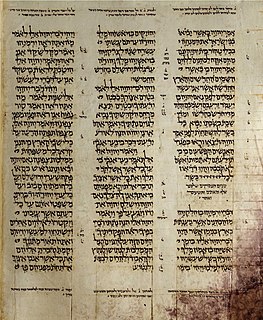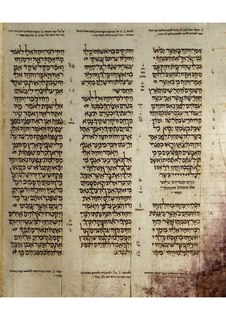
Jeremiah 52 is the fifty-second chapter of the Book of Jeremiah in the Hebrew Bible or the Old Testament of the Christian Bible. This book contains prophecies attributed to the prophet Jeremiah, and is one of the Books of the Prophets. This chapter contains a "historical appendix", matching the account in 2 Kings 24:18–25:30 of the end of national life in Judah, and also serving as a vindication of Jeremiah's message.

Jeremiah 29 is the twenty-ninth chapter of the Book of Jeremiah in the Hebrew Bible or the Old Testament of the Christian Bible. It is numbered as Jeremiah 36 in the Septuagint. This book compiles prophecies attributed to the prophet Jeremiah, and is one of the Books of the Prophets. This chapter records several "letters reported by the third-person narrator": from Jerusalem, Jeremiah sent a letter to the people in the Babylonia exile and he responded to a letter about him from Shemaiah.

Jeremiah 39 is the thirty-ninth chapter of the Book of Jeremiah in the Hebrew Bible or the Old Testament of the Christian Bible. It is numbered as Jeremiah 46 in the Septuagint. This book contains prophecies attributed to the prophet Jeremiah, and is one of the Books of the Prophets. This chapter is part of a narrative section consisting of chapters 37 to 44. Chapter 39 records the fall of Jerusalem, verses 1–10, and Jeremiah's fate, verses 11–18.

Jeremiah 21 is the twenty-first chapter of the Book of Jeremiah in the Hebrew Bible or the Old Testament of the Christian Bible. This book contains prophecies attributed to the prophet Jeremiah, and is one of the Books of the Prophets. This chapter contains a record of Jeremiah's message to King Zedekiah's emissaries and a warning to the House of David.

Jeremiah 36 is the thirty-sixth chapter of the Book of Jeremiah in the Hebrew Bible or the Old Testament of the Christian Bible. It is numbered as Jeremiah 43 in the Septuagint. This book contains prophecies attributed to the prophet Jeremiah, and is one of the Books of the Prophets. This chapter records the burning of a scroll of Jeremiah's prophecy by King Jehoiakim and the creation of another scroll by Baruch the scribe, acting on Jeremiah's instructions.

Jeremiah 33 is the thirty-third chapter of the Book of Jeremiah in the Hebrew Bible or the Old Testament of the Christian Bible. It is numbered as Jeremiah 40 in the Septuagint. This book contains prophecies attributed to the prophet Jeremiah, and is one of the Books of the Prophets.

Jeremiah 44 is the forty-fourth chapter of the Book of Jeremiah in the Hebrew Bible or the Old Testament of the Christian Bible. This book contains prophecies attributed to the prophet Jeremiah, and is one of the Books of the Prophets. This chapter is part of a narrative section consisting of chapters 37 to the present one. Chapters 42-44 describe the emigration to Egypt involving the remnant who remained in Judah after much of the population was exiled to Babylon. The Jerusalem Bible describes this chapter as "the last episode of Jeremiah's ministry".

Jeremiah 25 is the twenty-fifth chapter of the Book of Jeremiah in the Hebrew Bible or the Old Testament of the Christian Bible. This book contains prophecies attributed to the prophet Jeremiah, and is one of the Books of the Prophets. Chapter 25 is the final chapter in the first section of the Book of Jeremiah, which deals with the earliest and main core of Jeremiah's message. In this chapter, Jeremiah identified the length of the time of exile as seventy years.

Jeremiah 26 is the twenty-sixth chapter of the Book of Jeremiah in the Hebrew Bible or the Old Testament of the Christian Bible. It is numbered as Jeremiah 33 in the Septuagint. This book contains prophecies attributed to the prophet Jeremiah, and is one of the Books of the Prophets. This chapter contains an exhortation to repentance, causing Jeremiah to be apprehended and arraigned ; he gives his apology, resulting the princes to clear him by the example of Micah and of Urijah, and by the care of Ahikam.

Jeremiah 51 is the fifty-first chapter of the Book of Jeremiah in the Hebrew Bible or the Old Testament of the Christian Bible. This book contains prophecies attributed to the prophet Jeremiah, and is one of the Books of the Prophets. This chapter contains the last of a series of "oracles against foreign nations" which commences in chapter 46. Chapters 50 and 51 focus on Babylon. The New American Bible denotes this chapter as "the second oracle against Babylon", following on from "the first oracle" contained in chapter 50.

Jeremiah 27 is the twenty-seventh chapter of the Book of Jeremiah in the Hebrew Bible or the Old Testament of the Christian Bible. The material found in Jeremiah 27 is found in Jeremiah 34 and Jeremiah 50 in the Septuagint, which orders some material differently. This book contains prophecies attributed to the prophet Jeremiah, and is one of the Books of the Prophets. The New American Bible (NABRE) describes chapters 27-29 as "a special collection of Jeremiah’s prophecies dealing with false prophets", and suggests that "stylistic peculiarities evident in the Hebrew suggest that these three chapters once existed as an independent work".

Jeremiah 28 is the twenty-eighth chapter of the Book of Jeremiah in the Hebrew Bible or the Old Testament of the Christian Bible. The material found in Jeremiah 28 of the Hebrew Bible appears in Jeremiah 35 in the Septuagint. This book contains prophecies attributed to the prophet Jeremiah, and is one of the Books of the Prophets. This chapter contains a confrontation between prophets Jeremiah and Hananiah: Hananiah's false prophecy is responded by Jeremiah's answer, Jeremiah 28:1-9. Hananiah breaks Jeremiah's yoke, Jeremiah foretells an iron yoke, and Hananiah's death, Jeremiah 28:10-17.

Jeremiah 34 is the thirty-fourth chapter of the Book of Jeremiah in the Hebrew Bible or the Old Testament of the Christian Bible. It is numbered as Jeremiah 41 in the Septuagint. This book contains prophecies attributed to the prophet Jeremiah, and is one of the Books of the Prophets. This chapter anticipates the final moments in the assault of the Babylonian army against Jerusalem, when Jeremiah foretold the destruction of the city and the captivity of King Zedekiah, and sharply criticized the treacherous dealings of the princes and people with the slaves that provoked the punishment from God.

Jeremiah 35 is the thirty-fifth chapter of the Book of Jeremiah in the Hebrew Bible or the Old Testament of the Christian Bible. It is numbered as Jeremiah 42 in the Septuagint. This book contains prophecies attributed to the prophet Jeremiah, and is one of the Books of the Prophets. This chapter records the meeting of Jeremiah with the Rechabites, a nomadic clan, in which the prophet "contrast[s] their faithfulness to the commands of a dead ancestor with the faithlessness of the people of Judah to the commands of a living God".

Jeremiah 37 is the thirty-seventh chapter of the Book of Jeremiah in the Hebrew Bible or the Old Testament of the Christian Bible. It is numbered as Jeremiah 44 in the Septuagint. This book contains prophecies attributed to the prophet Jeremiah, and is one of the Books of the Prophets. This chapter is the start of a narrative section consisting of chapters 37 to 44. Chapter 37 records King Zedekiah's request for prayer, Jeremiah's reply to the king, and Jeremiah's arrest and imprisonment.

Jeremiah 40 is the fortieth chapter of the Book of Jeremiah in the Hebrew Bible or the Old Testament of the Christian Bible. This book contains prophecies attributed to the prophet Jeremiah, and is one of the Books of the Prophets. This chapter is part of a narrative section consisting of chapters 37 to 44. Chapter 40 recounts that Jeremiah chose to remain in Judah and that the occupying Babylonians appointed Gedaliah as governor.

Jeremiah 41 is the forty-first chapter of the Book of Jeremiah in the Hebrew Bible or the Old Testament of the Christian Bible. This book contains prophecies attributed to the prophet Jeremiah, and is one of the Books of the Prophets. This chapter is part of a narrative section consisting of chapters 37 to 44. Chapter 41 recounts the murder of Gedaliah, the Babylonian governor of occupied Judah, and the chaotic situation which followed this event. Jeremiah himself is not mentioned in this chapter.

Jeremiah 42 is the forty-second chapter of the Book of Jeremiah in the Hebrew Bible or the Old Testament of the Christian Bible. This book contains prophecies attributed to the prophet Jeremiah, and is one of the Books of the Prophets. This chapter is part of a narrative section consisting of chapters 37 to 44. Chapters 42-44 describe the emigration to Egypt involving the remnant who remained in Judah after much of the population was exiled to Babylon. In this chapter, the leaders of the community ask Jeremiah to seek divine guidance as to whether they should go to Egypt or remain in Judah, but they are found to be hypocrites in asking for advice which they intended to ignore.

Jeremiah 43 is the forty-third chapter of the Book of Jeremiah in the Hebrew Bible or the Old Testament of the Christian Bible. This book contains prophecies attributed to the prophet Jeremiah, and is one of the Books of the Prophets. This chapter is part of a narrative section consisting of chapters 37 to 44. Chapters 42-44 describe the emigration to Egypt involving the remnant who remained in Judah after much of the population was exiled to Babylon. In this chapter, Jeremiah performs in Egypt one of the sign-acts distinctive of his prophetic style.

Jeremiah 45 is the forty-fifth chapter of the Book of Jeremiah in the Hebrew Bible or the Old Testament of the Christian Bible. This book contains prophecies attributed to the prophet Jeremiah, and is one of the Books of the Prophets. This chapter closes the section comprising chapters 26–44 with the message that the prophetic word will survive through Baruch. In the New Revised Standard Version, this chapter is described as "a word of comfort to Baruch". Biblical commentator A. W. Streane calls it "a rebuke and a promise to Baruch".



